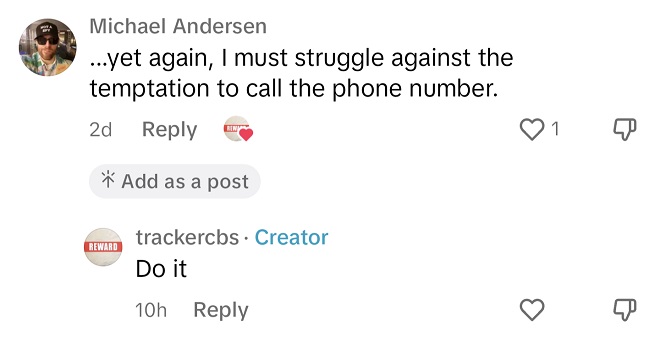
While scrolling through TikTok yesterday, I came across a video where an unseen cameraman stumbles across a Missing poster for an adorable dog named Buzz, sporting what appears to be a New England Patriots jersey (although we can’t blame him too much for that). There’s a reward for finding Buzz, although the specifics of that reward aren’t explicitly mentioned.
Even though I haven’t actually stumbled across an adorable puppy named Buzz (with or without a football jersey), I still called the phone number, just to make sure Buzz was still okay. Ordinarily this would be a bit of a jerk move – you don’t get someone’s hopes up when their dog is missing. However, I have an excuse this time – and that excuse provides an example of how to practice responsible alternate reality gaming etiquette.
Tracker and the Lucrative Reward Seeking Business
A detail I neglected to mention in this article’s introduction is that the TikTok account I found this “Missing” poster on was called @TrackerCBS, teasing an upcoming drama on the network. The channel follows a handful of aspiring “Reward Seekers”, eager to chase real life mysteries with cash payouts for rewards. One of the people running the channel tracked down a friend’s watch that was lost in a Los Angeles area park, for $30.
An under current throughout all of this is an extremely “hot, mysterious Batman in a SilverStream RV” named C.S., who tracked down a missing girl and likely recovered a stolen 1989 Porsche 911, as well. C.S. is likely Tracker protagonist Colter Shaw. But we’re here for the missing dog poster.
One of the standalone videos on the channel featured the scene of a man approaching the Missing poster in question, lingering on the phone number before moving along. While prior videos focused on fake 555 numbers or obscured identifying details like license plate numbers, this phone number was real.

It’s Okay to Call the Number…But Play It Safe (For Yourself and For Others)
Let’s review: so far, we’ve established that a clearly fictional property prominently and unambiguously featured a phone number, and prior behavior on the channel indicated that doing so was a deliberate choice. Great! Those are positive indicators that it’s okay to call the number.
There’s a long history of ARGs using phone numbers to deepen the mystery. As one of the larger scale examples, Year Zero hid a phone number in the spectrogram of an audio file, leading to “playback audio from an exceptionally violent wiretapped incident“. In an interview with Wired about the project, Trent Reznor claimed the number was called 1.7 million times. And those moments can be fairly magical. During a recent puzzle hunt through the streets of New York City called Great Gotham Challenge, one of the puzzles led our team of four to an outdoor ad for a “Puzzle Injury” law firm. Calling their number led to an automated phone tree puzzle that delivered the next step in the hunt.
But read that last paragraph one more time: the phone number in Year Zero was called 1.7 million times. And while most alternate reality games don’t attract that volume of attention and engagement, it’s still worth considering how to maintain safe boundaries.
Don’t Repeat Past Mistakes If They Can Be Avoided
I honestly don’t know if Year Zero‘s iconic phone number has gone dead or not – numbers will sometimes get recycled, just as website domains sometimes get passed on to new hands. But you don’t have to call the original phone number, because 16 years ago, someone uploaded the voicemail to YouTube that you can listen to without risking the potential for a wrong number.
Whenever you encounter a phone number that looks like it’s probably part of a game? Doing a quick check to see if anybody else called it is always a safe bet, as they can provide important caveats and warnings without overloading phone lines.
Last year, the Game Theorists YouTube channel started to chase a potential lead in the Five Nights at Freddy’s universe that potentially implicated a real world town. Because fans of the channel didn’t check to see the results of others’ investigations, that led to an influx of calls to local businesses that led MatPat to call off the hunt and set strict guidelines across his community that called for refraining from involving private businesses or individuals in games, and operating as a collective.
In this particular case, however, there weren’t any obvious signs that someone had tried calling the number with the Missing Dog poster.
When In Doubt? Test the Waters
While the TrackerCBS ARG had released a series of in-universe videos, there were no overt indications that the experience was designed to be interactive, aside from the phone number itself. However, one of the great things about potentially interactive experiences? It’s possible to test the waters, before taking the plunge.

Before I called the number on the Missing Dog poster? I dropped a comment on the video projecting my intentions, allowing the team to encourage that behavior, or dissuade it. And boy howdy, did they egg me on.
When Lance Weiler released his project Pandemic 1.0 through the Sundance Film Festival, he released a short film whose title included GPS coordinates a two hour drive from where I lived at the time. Weiler had previously done some pretty crazy stuff involving interactive theater, and the Sundance project itself was supposed to be highly location specific. So, I shared publicly about my attempt to make the road trip out to check out the site. Shortly after doing so, I received a private message from Weiler noting that while I was more than welcome to make the trip, I wasn’t likely to find anything, potentially saving me from a wasted trip.
I’ve previously written about how alternate reality games are often a dance between player and creator, and part of dancing is signaling your moves before you take them, and watching to see how your counterpart responds to those signals, trusting they have your best interests at heart.
Even with these security measures in place, mistakes will happen. During the Halo 3 alternate reality game Iris, players did (almost) everything right. While investigating the profile of a confirmed fictional character in the game called Adjutant Reflex, they noticed a nine digit number string in the profile that looked suspiciously like a phone number.
To test that theory, they designated a few players to ring up the ten numbers and see if there was anything suspicious. And after dialing one of the numbers? They thought they hit the jackpot – a voicemail message clipped from the popular Halo machinima series, Red vs Blue. The floodgates opened, and 300 phone calls later a very confused college student emerged from his lectures to realize corners of the internet were convinced he was launching the next Halo game.
But cases like that are exactly why it’s best to exercise caution, even for the most seemingly obvious connections.
Be Prepared to Leave a Record
After dialing the number on the Missing poster, I reached a Google Voice mailbox that asked for my name…before forwarding the call over to a live person on the other end, who confirmed he was the one who put up the Missing posters looking for Buzz.
Whenever I call ARG-adjacent numbers I make it a habit to record the audio from the calls so I can reference things like the automated voicemail response for Generation Loss‘ Missing Poster, after the fact. While this isn’t necessary when it’s a voicemail on the other end, it becomes incredibly important in cases where an actual person picks up on the other end, and you might not get a second chance to call.
My conversation with the man on the other end was brief: when asked if I found Buzz, I admitted that I hadn’t, but wanted to confirm whether Buzz was still missing since sometimes the posters stick around after the dog had been found. He reassured me that the dog was safe and at home, so I ended the call happily, knowing that – at least for our call – Buzz had a happy ending.
Would something else have happened if I “lied” and said I found Buzz? I can’t say…which is one of the parts of live phone calls that’s so exciting.
Is all of this care and consideration overkill? Probably…but playing ARGs (especially when you’re not sure if it’s actually an ARG or not) is about balancing the thrill of something that feels real, with the potential consequences of having your fiction spill over into other peoples’ reality.
Back to Tracker, One Last Time: Is This an ARG, or Not?
Tracker CBS is doing something interesting with its in-universe teasers, across social media. The social media accounts on TikTok, Instagram, and Twitter are overtly branded on the outside, but appear to be fairly committed to delivering in-universe content within those feeds.
And the process of learning what type of project this is will be determined by watching how it responds to its audience – not just through the telephone number from a random Missing Poster, but from the experience as a whole. There’s just a few guardrails that can help make that learning process a little safer, for all involved. So, use any phone numbers you might find while digging into this responsibly.
EDITED TO ADD: shortly after my call, TrackerCBS added a comment to the video confirming that the owner reported Buzz has been found.
